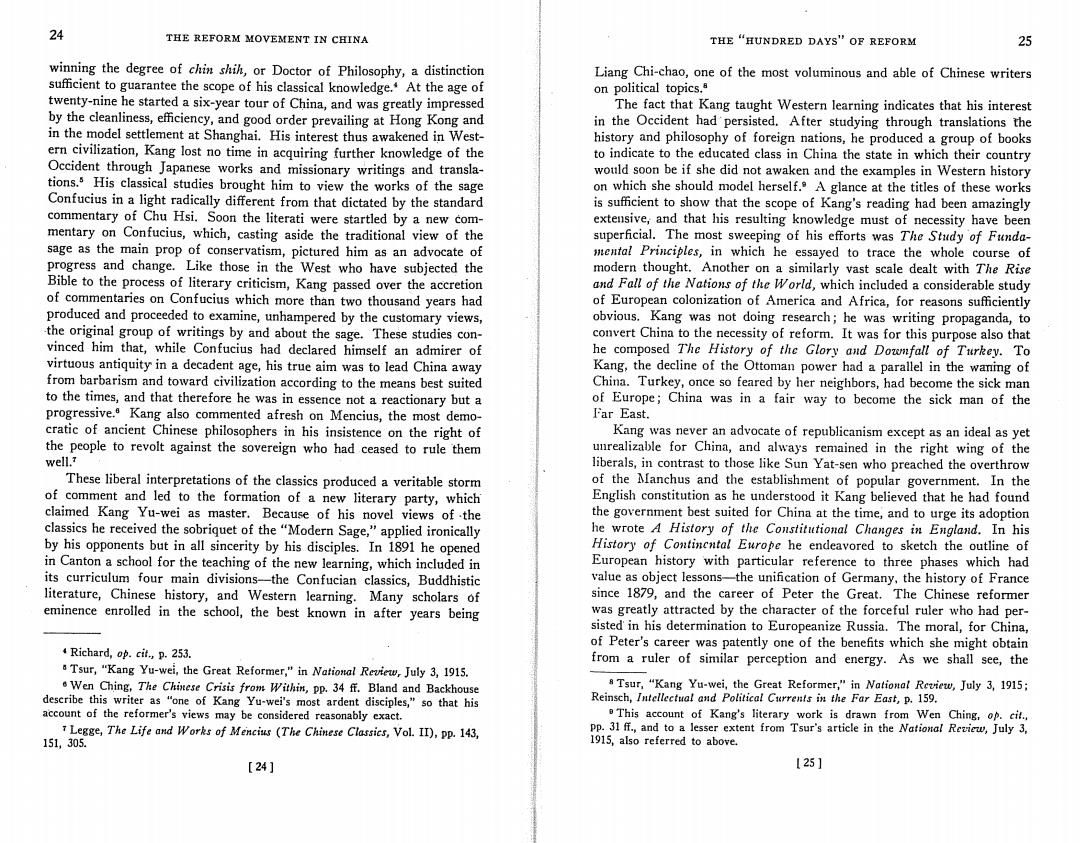正在加载图片...

24 THE REFORM MOVEMENT IN CHINA THE“HUNDRED DAYS'”OF REFORM 25 winning the degree of chin shih,or Doctor of Philosophy,a distinction Liang Chi-chao,one of the most voluminous and able of Chinese writers sufficient to guarantee the scope of his classical knowledge.At the age of on political topics. twenty-nine he started a six-year tour of China,and was greatly impressed The fact that Kang taught Western learning indicates that his interest by the cleanliness,efficiency,and good order prevailing at Hong Kong and in the Occident had persisted.After studying through translations the in the model settlement at Shanghai.His interest thus awakened in West- history and philosophy of foreign nations,he produced a group of books ern civilization,Kang lost no time in acquiring further knowledge of the to indicate to the educated class in China the state in which their country Occident through Japanese works and missionary writings and transla- would soon be if she did not awaken and the examples in Western history tions.5 His classical studies brought him to view the works of the sage on which she should model herself.A glance at the titles of these works Confucius in a light radically different from that dictated by the standard is sufficient to show that the scope of Kang's reading had been amazingly commentary of Chu Hsi.Soon the literati were startled by a new com- extensive,and that his resulting knowledge must of necessity have been mentary on Confucius,which,casting aside the traditional view of the superficial.The most sweeping of his efforts was The Study of Funda- sage as the main prop of conservatism,pictured him as an advocate of mental Principles,in which he essayed to trace the whole course of progress and change.Like those in the West who have subjected the modern thought.Another on a similarly vast scale dealt with The Rise Bible to the process of literary criticism,Kang passed over the accretion and Fall of the Nations of the World,which included a considerable study of commentaries on Confucius which more than two thousand years had of European colonization of America and Africa,for reasons sufficiently produced and proceeded to examine,unhampered by the customary views, obvious.Kang was not doing research;he was writing propaganda,to the original group of writings by and about the sage.These studies con- convert China to the necessity of reform.It was for this purpose also that vinced him that,while Confucius had declared himself an admirer of he composed The History of the Glory and Downfall of Turkey.To virtuous antiquity in a decadent age,his true aim was to lead China away Kang,the decline of the Ottoman power had a parallel in the waning of from barbarism and toward civilization according to the means best suited China.Turkey,once so feared by her neighbors,had become the sick man to the times,and that therefore he was in essence not a reactionary but a of Europe;China was in a fair way to become the sick man of the progressive.Kang also commented afresh on Mencius,the most demo- Far East. cratic of ancient Chinese philosophers in his insistence on the right of Kang was never an advocate of republicanism except as an ideal as yet the people to revolt against the sovereign who had ceased to rule them unrealizable for China,and always remained in the right wing of the well. liberals,in contrast to those like Sun Yat-sen who preached the overthrow These liberal interpretations of the classics produced a veritable storm of the Manchus and the establishment of popular government.In the of comment and led to the formation of a new literary party,which English constitution as he understood it Kang believed that he had found claimed Kang Yu-wei as master.Because of his novel views of the the government best suited for China at the time,and to urge its adoption classics he received the sobriquet of the"Modern Sage,"applied ironically he wrote A History of the Constitutional Changes in England.In his by his opponents but in all sincerity by his disciples.In 1891 he opened History of Contincntal Europe he endeavored to sketch the outline of in Canton a school for the teaching of the new learning,which included in European history with particular reference to three phases which had its curriculum four main divisions-the Confucian classics,Buddhistic value as object lessons-the unification of Germany,the history of France literature,Chinese history,and Western learning.Many scholars of since 1879,and the career of Peter the Great.The Chinese reformer eminence enrolled in the school,the best known in after years being was greatly attracted by the character of the forceful ruler who had per- sisted in his determination to Europeanize Russia.The moral,for China, of Peter's career was patently one of the benefits which she might obtain 4Richard,op.cit.,p.253. from a ruler of similar perception and energy.As we shall see,the Tsur,"Kang Yu-wei,the Great Reformer,"in National Review,July 3,1915. Wen Ching,The Chinese Crisis from Within,pp.34 f.Bland and Backhouse s Tsur,"Kang Yu-wei,the Great Reformer,"in National Review,July 3,1915; describe this writer as "one of Kang Yu-wei's most ardent disciples,"so that his Reinsch,Intellectual and Political Currents in the Far East,p.159. account of the reformer's views may be considered reasonably exact. This account of Kang's literary work is drawn from Wen Ching,op.cit., 1 Legge,The Life and Works of Mencius (The Chinese Classics,Vol.II),pp.143, Pp.31 ff.,and to a lesser extent from Tsur's article in the National Reziew,July 3, 151,305. 1915,also referred to above. [24] 125]